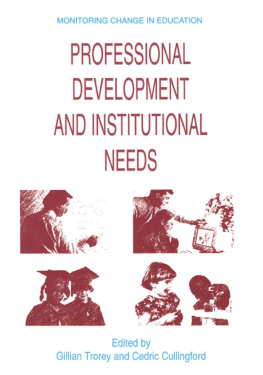PROFESSIONAL DEVELOPMENT AND INSTITUTIONAL NEEDS
Professional Development and Institutional Needs
Edited by
GILLIAN TROREY and CEDRIC CULLINGFORD
University of Huddersfield, UK
First published 2002 by Ashgate Publishing
Published 2017 by Routledge
2 Park Square, Milton Park, Abingdon, Oxon OX14 4RN
711 Third Avenue, New York, NY 10017, USA
Routledge is an imprint of the Taylor & Francis Group, an informa business
Copyright Gillian Trorey and Cedric Cullingford 2002
All rights reserved. No part of this book may be reprinted or reproduced or utilised in any form or by any electronic, mechanical, or other means, now known or hereafter invented, including photocopying and recording, or in any information storage or retrieval system, without permission in writing from the publishers.
Notice:
Product or corporate names may be trademarks or registered trademarks, and are used only for identification and explanation without intent to infringe.
British Library Cataloguing in Publication Data
Professional development and institutional needs. -
(Monitoring change in education)
1.Teachers - In-service training 2.Teachers - Training of
I.Trorey, Gillian II.Cullingford, Cedric
370.7'11
Library of Congress Control Number: 2001099937
ISBN 13: 978-0-7546-1277-3 (hbk)
Contents
Gillian Trorey
Richard Pring
Rachel Brooks
Christopher Day
Julia Corkindale and Gillian Trorey
Catherine Scott and Steve Dinham
Ros Ollin
Steve Belbin and Helen Swift
Adrian Raynor
Cedric Cullingford and Helen Swift
Christopher Greenfield and Cedric Cullingford
John Blewitt
Cedric Cullingford
Steve Belbin is Head of Dallas Road Primary School, Preston, Lancashire.
Dr John Blewitt is Lecturer in the Centre for Continuing Education at the University of Bradford and consultant for the Learning and Skills Development Agency Good Practice in Sustainable Development Education project.
Dr Rachel Brooks is Lecturer in the Department of Education at the University of Southampton.
Dr Julia Corkindale is Senior Lecturer and staff development co-ordinator at Kingston Further Education College.
Cedric Cullingford is Professor of Education at the University of Huddersfield.
Christopher Day is Professor of Education at the University of Nottingham.
Steve Dinham is Professor in Education Leadership at the University of New England, Armidale, New South Wales.
Dr Christopher Greenfield is Head of the International School at Sherborne College, Dorset.
Ros Ollin is Principal Lecturer in Post-Compulsory Education and Training in the School of Education and Professional Development, and member of the Staff Development Group of the University of Huddersfield.
Richard Pring is Professor and Head of the Department of Educational Studies at the University of Oxford.
Dr Adrian Raynor is a former head teacher now working as an NPQH trainer and freelance consultant.
Dr Catherine Scott is a Lecturer in Statistics in the School of Psychology at the University of Western Sydney, Australia.
Helen Swift is Principal Lecturer and Head of Continuing Professional Development in the School of Education and Professional Development, University of Huddersfield.
Dr Gillian Trorey is Head of Staff Development in the School of Education and Professional Development, and member of the Staff Development Group of the University of Huddersfield.
In all sectors of education, professional development has traditionally been a personal matter; autonomous professionals taking responsibility for their own development as a matter of personal choice. In attempting to meet the demands of external accountability and organisational effectiveness, the personal and professional development of individuals has become marginalised in recent times, further increasing the difficulties of reconciling the needs of the individual and the institution. The new managerial pragmatism assumes that the only investment in the individual that is worthwhile is one that has an immediate and accountable effect on the functioning of the institution. This has resulted in a plethora of instrumental staff development activities that allow little time for systematic reflection and deeper understanding.
Yet, in a time of unprecedented change and complexity in education, the subject of individual development is of great importance; self knowledge, emotional resilience and flexibility are personal attributes that can only contribute to organisational development the development of a learning organisation.
This book is a study of what is taking place in professional development in education. Through the accounts of researchers and practitioners, it seeks empirical evidence to explore the impact of policy on the professional development of individuals, and the effect of professional development on teaching and school effectiveness. The importance of effective leadership is a recurring theme.
All sectors of education are covered, but the driving principle is not so much to survey all that is taking place but to point up, through case studies, those real incidents, clearly analysed, that can enhance understanding of the issues and lead to the exploration of possible solutions.
The editors would like to thank Julie Gledhill and Susan Smith for their help in the preparation of the camera-ready copy.
Though initially organizations are creatures of people, they tend over time to become separated from people, functioning independently in pursuit of their own goals and purposes. This has to be bridged somehow.
(Sergiovanni, 1997, p.232)
Professional development has assumed great importance in all sectors of education over the last few years. Facing both external and internal pressures, schools, colleges and higher education institutions have been forced to undergo rapid change. The focus on higher standards and improving quality and the demands of increasing accountability mean that teachers and lecturers have an unprecedented need for ongoing professional development.
Each sector now has standards or competencies for the assessment of performance; performance managed pay is becoming a reality. We have the Teacher Training Agency and the General Teaching Council, the Further Education National Training Organisation and the Institute of Learning and Teaching in Higher Education, as well as more business orientated organisations such as Investors in People.
This situation results in many tensions. National priorities for teacher development, often with funding attached, may mean that the specific development needs of a school, department or faculty, or individuals within them, remain unaddressed. As schools and colleges and higher education departments or faculties have become responsible for their own resources, so staff development is increasingly managed at that level. Head teachers and departmental heads now have responsibility for balancing these external demands against those of their individual school or department, and the needs of their individual staff. One of the themes of this book is the recognition of these competing demands and the debate about ways of resolving them.













